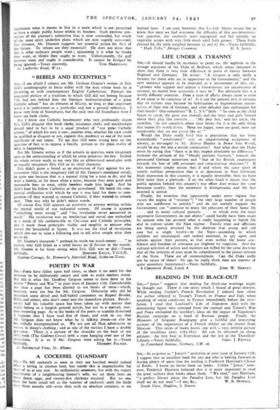"REBELS AND ECCENTRICS"
am afraid I cannot see Mr. Graham Greene's review of Eric Gill's autobiography in focus either with the man whose book he is reviewing or with contemporary English Catholicism. Perhaps the suggested picture of a tradition to which Gill did not belong because "he had not behind him the baroque internationalism of a great Catholic school" has an element of felicity, so long as that important word a is understood as a particular and not a general reference. I know very little of Stonyhurst, but the only two old Stonyhurst boys I know are bank clerks.
But I know one Catholic headmaster who Very profoundly shares Eric Gill's disquiet that bank.clerks, insurance clerks and stockbrokers should tend in fact to be a usual product of "our great Catholic schools" of which his own is one ; another who, whether his view could be qualified as disquiet or not, regards this tendency as-one of the most significant of our times. To say that Gill went wrong here on the question of fact is to oppose a fancifu picture to the plain reality of what is happening. But Mr. Greene writes as if the schools in question were imaginary ones to the understanding of which he alone possesses the key. Indeed the whole review reads to me very like an abbreviated novel-plot with an equally imaginary Eric Gill as its chief character.
Eric didn't grow a beard as an expression of fury against his en- vironment (that is the imaginary Gill of Mr. Greene's emotional novel), he grew one because that is a normal thing for a man to do; and he wore a biretta, or far iniare Often a beret, because they Were good and reasonable hats to wear, while bowlers made him laugh. And he didn't hate his fellow Catholics cir the priesthbod. He hated the com- mercial civilisation with which he saw it was fatal for them to com- promise—if they Wanted to remain Catholic, if they wanted-to remain men. That was why he didn't mince words. " ' Of course Eric Gill appears an eccentric 'to anyone writing within the mental world of our industrial- system. Of course it appears "something went wrong" and "his revolution never amounted to much." His revolution was an intellectual and moral one embodied in a mode of life conformable to Chr.stian and Catholic principles, and it made those principles visible and tangible to anyone who visited the household at Speen. It was not the kind of revolution which sets out to raise a following and to tell other people what they are to do.
Mr. Greene's innuendo" perhaps he made too much money. ... "to explain why Gill failed as a rebel leaves an ill flavour in the mouth. Mr. Greene is far from seeing what_ Eric Gill was or did.—Yours Aquinas Cottage, Dominic's, Hartshill Road, Stoke-on-Trent.






























 Previous page
Previous page